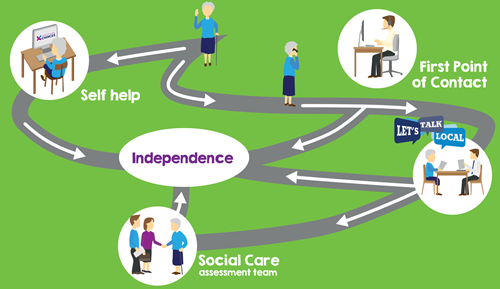Factsheet 1: Introduction to Adult Social Care
Factsheet 1 - PDF version
Print or download a PDF version »Shropshire Council aim to increase people’s wellbeing by promoting choice and control, with a focus on developing and maintaining independence. These are some of the key principles we work to in Shropshire:
- Reducing dependence on paid support, and enabling and maximising individual independence and wellbeing
- Supporting and empowering individuals to make their own decisions
- Maximising the use of local community resources and natural support and developing local resilient communities
- Promoting positive mental wellbeing, independence and resilience in our community
- Focusing on supporting and enabling carers to continue in their vital role, whilst establishing and maximising the use of peer support
What you can expect
In Shropshire, we aim to address people’s queries quickly and effectively. We're able to do this in a number of ways:
- Online information and resource directory
- Telephone advice line
- Directing you to other organisations in your local community
- Arranging an appointment at our ‘Let’s Talk Local’ information and advice sessions (we will confirm any appointment by letter)
- Arranging a visit to your home where necessary

We believe in giving the right response, guidance and information to people at the right time and in the right way. We encourage and enable people to look at the community around them and find out what's already available that can benefit them. We can work with people to help strengthen these networks of support and advice, as well as having professional social workers and occupational therapists for those people who need more support.
What to do if you have a query that relates to care and support for adults
- Find helpful information yourself by looking through the other sections of Shropshire Choices
- Find out details of your nearest Let’s Talk Local drop-in session and call in for brief information and guidance
- Call the First Point of Contact team (FPoC) on 0345 678 9044
The skilled adviser you speak to at FPoC will need to find out some details about you (or the person you are ringing about) and your situation. Depending on your circumstances the adviser may:
- Sort out your query over the phone
- Put you directly in touch with another team or service
- Give you details of another organisation to contact
- Offer you an appointment at one of our ‘Let’s Talk Local’ sessions in a town near you if you need to have a longer discussion in private
- Arrange a home visit
What to do if you're worried about yourself or someone you know being at risk of abuse
If you have any worries about yourself or someone you know being at risk of abuse or harm, it's important that you speak to an adviser who will listen to your concerns and agree the best way forward. You can:
- Call 0345 678 9044, or outside of office hours please contact the Emergency Social Work Duty team on 0345 678 9040.
- Alternatively, you can report abuse using the online form on the Shropshire Council website.
Find more information in Factsheet 2: Concerned about someone – adult safeguarding
How we can help if you're a carer
We support unpaid or ‘family carers’ in much the same way as the person they care for, as required by the Care Act 2014. After getting in touch you may be invited to complete a carers assessment to make sure you're getting the type of support you need. We can tell you more about carer support and other services in your local area that may be able to offer further guidance and support.
Find more information in Factsheet 5: Support for carers and Factsheet 6: Care Act assessment.
What to expect at Let’s Talk Local

Let’s Talk Local sessions are organised by staff and volunteers who are there to offer people a warm and friendly welcome. Sessions take place in venues across Shropshire and are designed to be easy to access and convenient to get to. Staff from other voluntary sector organisations, such as housing advice or carer support, also attend the Let’s Talk Local sessions to share their particular skills and knowledge. Working together in this way means that you have access to a wide range of information and guidance in one place. The meetings are an informal opportunity for people to find out more about adult social care support in Shropshire and to discuss their personal circumstances. The person you speak to will find out if you need to have some support in order to be fully involved in the discussion, or to establish whether an assessment may be required. If you need help to identify a suitable person to support you then the adviser will arrange for an independent advocate to support you.
The adviser will want to keep a record of the conversation you have: we call this record your ‘personal profile’. You'll have the opportunity to agree what information should be recorded on your profile.
Find more information in Factsheet 3: Let’s Talk Local
Personal profile
The personal profile prompts conversation about all areas of your life, and asks questions about what's really important to you in relation to having a good life, staying independent and living in the community. The adviser will talk to you about the things that are working well in your life, as well as those things that aren't working so well and may need some support or change. At the end of the personal profile you and your adviser may complete a short action plan with a list of the things that need to be done, and who's going to do them. Some of these actions may be completed by the adviser or other support organisations; other actions may be completed by you or someone who supports you.
Following your meeting, you'll be sent a copy of your personal profile. In case you need to get back in touch with us in future, we'll also keep a copy.
Needs assessment
In some cases it will be necessary for the adviser to have a more detailed conversation with you, building on the information contained in the personal profile: they may ask you for more detail about any needs you have that impact on your day-to-day living, such as getting up and getting washed and dressed in the morning. The adviser will ask you to look at all areas of your daily life, and help you to think about what you're able to do for yourself or with the help of others, and any changes you may be able to make that would have a positive impact on your wellbeing.
This detailed needs assessment will help to determine how your disability or condition affects you and whether you'd be able to get our support to meet your eligible needs. (Find more information about eligibility in Factsheet 6: Care Act assessment). If you receive support from family or friends, you may want to consider having a combined assessment together. A combined needs assessment captures your own needs, but also any needs the person who supports you may have as a result of the care and support they give you. Putting you at the heart of the assessment process and involving the people who matter most to you is the best way to understand your needs, the goals you have and things you would like to achieve, and to have a clear picture of how these things affect your wellbeing, and also impact on your family, friends and wider support network.
If you'd like to know more about our needs assessment process and the national eligibility criteria you can find more information in Factsheet 5: Support for carers and Factsheet 6: Care Act assessment
Paying for your care and support
If the result of your assessment is that you'll need some care or support from an organisation that charges for their service, the next step will be for you to have a financial assessment.
Payment is only required to access some types of care and support services. A financial assessment won't be necessary if your needs are able to be met by the wide range of voluntary and community sector organisations and/or by other natural forms of support (eg family, friends, neighbours, community groups etc) that may be available to you.
The financial assessment will be carried out by our financial assessments team, and is designed to find out how much money you're likely to have to contribute towards the cost of any paid care or support. The amount that you have to pay will be based on your income and what savings and other capital you have. For a full explanation of what we would count as capital, please find further information in the link to Factsheet 7 below.
The government says that anyone considered to have over £23,250 will be required to pay for the full cost of their care or support. If you have less money than this, the financial assessment will work out the amount you need to pay to contribute towards the full cost of your care and support. The amount of contribution you'll be required to pay will take into account the amount of money the government says that you need to be left to live on.
The financial assessment process won't stop or delay your needs assessment. Find more information in Factsheet 7: Paying for your care and support.
Other considerations
There are a number of factors to consider when we start to look at how to meet your identified eligible needs. As well as thinking about the outcome you're trying to achieve and your financial circumstances, we may also take into reasonable consideration our own financial position. In determining how an individual’s needs should be met (but not whether those needs are met) we may reasonably consider how to balance our budgetary requirements with the duty to meet your eligible needs. We won't set arbitrary upper limits on the costs we're willing to pay to meet needs through certain routes, as this would conflict with our person-centred values and approach.
We'll make decisions on an individual basis. We'll weigh up the total costs of all potential options for meeting needs, and cost will be included as a factor in deciding between alternative options for meeting your needs. Although cost is a factor this doesn't mean always choosing the cheapest option, but rather the one which meets your needs and achieves your desired outcomes for the best value.
Help to plan your care and support
Once we know which of your needs require funded support, and have established how much help you'll need and how much time this is likely to take, we can start to work out how much this might cost. We call this figure your ‘indicative personal budget’. The amount is only provisional at this stage until we've completed a ‘support plan’ with you, and this has been agreed. You'll be assisted to develop your own support plan, which will detail how your eligible needs and outcomes will be met. The plan will provide information about the support you receive from friends and family, voluntary organisations and community groups, as well as any services that need to be paid for.
Support planning
Find out more in Factsheet 8: Planning your support
Working together, we'll begin to develop your support plan with a clear view of any barriers that might stop you from achieving your specific goals and outcomes. We can use information from your needs assessment to help identify the things that you're able to do or can continue doing for yourself, and what it is you require support with.
We'll have a further discussion on what's available to support you in your local community, and explore the types of services you may wish to purchase using your personal budget.
We'll work with you to obtain quotations where necessary to include in your support plan, and use these to calculate what the full costs will be. We'll explain the options available to you, with regard to receiving and managing your personal budget.
More information is available about the different options for managing your personal budget from your social work practitioner and in Factsheet 9: Managing Your personal budget, Factsheet 10: Having a direct payment and Factsheet 11: Having an individual service fund (ISF).
Living life
Once you and your adviser are happy that you have completed your proposed support plan, the plan has to be reviewed and approved by us. Once your plan has been approved you'll be notified of your final personal budget amount and the total cost of any contribution you'll have to make. If you require our support we'll assist you to organise the care and support that has been agreed.
Depending on your chosen option for managing your personal budget, you'll then begin to receive the services with as little or as much control over them as you wish or need to have. We'll review your progress on a regular basis, and as and when your needs or circumstances change. The frequency of reviews and reassessments will be discussed and agreed with you as part of the assessment and support planning process.
How to let us know if you had a great service or if you want to make a complaint
As part of ongoing monitoring and improvement of our services, we sometimes ask people who have used our services for feedback about their experiences. When you meet one of our workers you may be offered the opportunity to answer a simple customer satisfaction survey, or receive a follow up call sometime after your appointment to ask how things are now and how satisfied you are with the service you received.
If you're happy to speak to the worker you've seen they will be happy to receive any feedback, or you can also call 0345 678 9000 with your comments.
If you feel you've had a particularly positive experience, or you have a significant concern or issue with the service and prefer to make a formal complaint, you can choose one of the following ways to do this:
Call 0345 678 9044
Email complaints&scrutiny@shropshire.gov.uk
Complete our online feedback form
Or write to:
Complaints and scrutiny unit
Shropshire Council
Shirehall
Shrewsbury SY2 6ND
How we use your personal information
Everyone's personal information is protected by the Data Protection Act 1998.
We make sure that the information we keep about you is:
- Relevant – we only collect information that we need to be able to provide you with
the service - Correct – we do our best to make sure that our information is up to date. To help us do this please let us know about any change in your personal details, such as if your address has changed
- Kept confidential – from people who don't need to see it. You have the right to see the information that we hold about you. You can make a request at any time to see this information by talking to your social care practitioner or completing an online form. We'll only share information about you with others when it's necessary (eg with other organisations who can support you) when you've given us your permission to do this.
Making it Real
Making it Real advisory groups are made up of people who have an interest or are involved in social care services for adults. The advisory groups make recommendations for areas to develop and improve.
If you’d like to join us in our efforts to place the people of Shropshire at the heart of shaping the future of adult social care in the county, then get in touch. Your ‘own experience’ can inform change for the better.
If you'd like to discuss concerns, experiences or wish to contribute ideas then join our friendly meetings. There are currently three groups located in Ludlow, Shrewsbury and Market Drayton. Your views will always be taken seriously.
Get in touch with Making it Real today and contribute to helping to create a better life for people in Shropshire. Email us at makingitreal@shropshire.gov.uk or call on 01743 257705.
Shropshire needs you!


Passionate about adult social care? Have your say and make a positive difference.